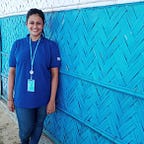Mask making in Cox’s Bazar leading a way to handle the pandemic
Meet the women in Cox’s Bazar utilizing their skills to protect their community from COVID-19.
Roksana and Moyuna have never met and they likely never will. They sit at similar sewing machines less than 20kms away from each other, carefully folding and stitching together layers of fabric that will soon become reusable cloth masks that will be distributed to members of their community.
Though the two women have never met, they’re both connected by a desire to protect their respective communities as cases of COVID-19 in the Rohingya refugee camps and surrounding host community creep ever higher.
The first case of COVID-19 was confirmed in Bangladesh on 7 March, four months later and the number has climbed to almost 230,000 confirmed cases. Shortly after the first case was confirmed, the Government of Bangladesh placed restrictions on people's movements and closed shops and markets selling non-essential goods to try and curb the spread of the virus.
The restrictions, necessary to save lives in a global pandemic, have impacted many people's livelihoods, including Roksana who says it became tough to feed her children.
“My husband hasn’t had any work [since the beginning of COVID-19 restrictions],” she says. “After the COVID-19 pandemic struck Bangladesh, I couldn’t feed my children. I couldn’t give them what they were asking for so it was getting tough. I also feel more useful in making these masks and doing something for my community because before I didn’t have much to do except household chores.”
For families like Roksana’s who relied on daily wage work, being able to earn income by making these masks has been a lifeline to help them survive the pandemic and keep food on the table each day.
Meanwhile in the refugee camps, families continue to rely on humanitarian aid for survival. Moyuna is the head of one of these families, a single mother who fled Myanmar in 2017 with her two children. Though she receives food assistance and other humanitarian aid she is unable to buy other necessities we take for granted. There are few income opportunities for refugees living in the camps which has increased their vulnerability over the two-and-a-half years they’ve been living in Bangladesh.
Moyuna receives around US$0.17 per mask she produces and the masks are distributed to refugees in the camps. Although the money allows her some freedom to buy extra food and essential medications, she says that isn’t why she’s working on the project.
“People are dying and suffering because of coronavirus so to help them avoid that situation, I am making these [masks] happily. No matter if I am paid or not, people will be alive and will keep me in their prayer.”
In these refugee camps, physical distancing is difficult, if not impossible. Hundreds of thousands of makeshift shelters populate the land with less than 1 meter between them. Facilities such as toilets and water pumps are shared between families and cleanliness can be difficult. In this context, distributing and wearing masks is more important than ever as the Rohingya and humanitarian community work to slow the spread of COVID-19 in the camps.
The first of Moyuna’s masks were distributed to households with vulnerable and elderly people, then to refugees working on critical, life-saving activities with WFP. As more masks are produced through WFP and other humanitarian programs, the goal is to be able to provide every refugee in the camps with at least two masks.
This initiative is through WFP’s livelihoods program in the host community and the self-reliance programme in the refugee camps. The livelihoods programme is funded by Canada, France, the Netherlands, UK Aid, Denmark, Australia, and USAID. The self-reliance program is funded by the Netherlands, Australia, Japan, and USAID.
